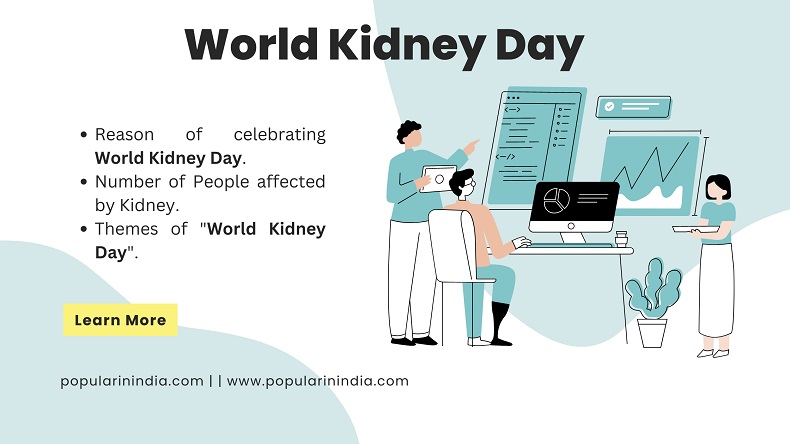World Kidney Day is an annual global campaign observed on the second Thursday of March(this year 9th March 2023) to raise awareness about the importance of kidney health and the growing burden of kidney diseases worldwide. The campaign aims to raise awareness about the crucial role that kidneys play in maintaining overall health and wellbeing, and to promote the importance of preventive measures and early detection of kidney diseases.

About World Kidney Day?
World Kidney Day was first observed in 2006 and has since become a global health awareness campaign, with events and activities taking place in over 100 countries. Each year, the campaign focuses on a different theme related to kidney health, with the aim of raising awareness and encouraging action to address specific issues related to kidney health and disease.
Some of the key messages that are highlighted during World Kidney Day include the importance of maintaining a healthy lifestyle, such as eating a balanced diet and staying physically active, as well as the importance of regular health check-ups, especially for those who are at higher risk of kidney disease, such as people with diabetes or high blood pressure.
Overall, World Kidney Day provides an important opportunity to raise awareness about the importance of kidney health, and to encourage individuals and communities to take action to prevent kidney diseases and promote better kidney health for all.
Why We Celebrate World Kidney Day?
We celebrate World Kidney Day to raise awareness about the importance of kidney health and the growing burden of kidney disease worldwide. Kidney disease is a serious and often under-recognized health problem that can lead to a range of complications and even death. Kidneys play a vital role in maintaining overall health and wellbeing by filtering waste products and excess fluids from the body, regulating blood pressure, producing hormones that stimulate red blood cell production, and maintaining electrolyte balance.
The aim of World Kidney Day is to raise awareness about the importance of preventive measures and early detection of kidney disease, and to encourage people to take action to maintain good kidney health. This includes promoting healthy lifestyle habits such as regular exercise, maintaining a balanced diet, avoiding smoking and excessive alcohol consumption, and getting regular health check-ups.
World Kidney Day also provides an opportunity to advocate for policies and programs that support better kidney health and improve access to kidney disease prevention and treatment services. By raising awareness and promoting action on kidney health, World Kidney Day aims to reduce the burden of kidney disease and improve health outcomes for individuals and communities worldwide.
Themes of World Kidney Day
The theme of World Kidney Day changes each year to focus on a different aspect of kidney health and disease. The theme is chosen by the International Society of Nephrology (ISN) and the International Federation of Kidney Foundations (IFKF) to raise awareness about important issues related to kidney health and to promote action to prevent kidney disease and improve kidney health worldwide.
- 2022: Living well with kidney disease.
- 2021: Living well with kidney disease – Patient-Reported Outcomes.
- 2020: Kidney Health for Everyone Everywhere – from Prevention to Detection and Equitable Access to Care.
- 2019: Kidney Health for Everyone Everywhere.
- 2018: Kidneys and Women’s Health: Include, Value, Empower.
- 2017: Kidney Disease and Obesity: Healthy Lifestyle for Healthy Kidneys.
- 2016: Kidney Disease & Children. Act Early to Prevent It!
Kidney Day in India
World Kidney Day is observed in India along with the rest of the world on the second Thursday of March each year. The day is marked by a range of events and activities aimed at raising awareness about the importance of kidney health and the growing burden of kidney disease in India.
In India, kidney disease is a major public health problem, with a high burden of both chronic kidney disease (CKD) and end-stage kidney disease (ESKD). According to the Indian Society of Nephrology, an estimated 17% of the Indian population has some form of kidney disease, and over 200,000 people require renal replacement therapy each year.
Preventive Health tests for Kidney
Preventive health tests can help detect kidney disease early, when it is more treatable. Here are some of the tests that can be used to monitor kidney health and detect kidney disease:
- Blood tests: Blood tests such as creatinine and blood urea nitrogen (BUN) can provide information about how well the kidneys are functioning. These tests measure the levels of waste products in the blood that the kidneys are responsible for filtering out.
- Urine tests: Urine tests can detect the presence of protein or blood in the urine, which can be an early sign of kidney damage. A urinalysis can also be used to measure kidney function by assessing the amount of creatinine in the urine.
- Imaging tests: Imaging tests such as ultrasound or CT scan can be used to detect structural abnormalities or blockages in the kidneys or urinary tract.
- Glomerular filtration rate (GFR) test: The GFR test is used to measure the rate at which the kidneys are filtering waste products from the blood. This test provides a more accurate assessment of kidney function than creatinine or BUN levels alone.
- Kidney biopsy: A kidney biopsy may be performed in some cases to help diagnose the cause of kidney disease and to guide treatment.
It’s important to note that these tests are usually recommended for people with risk factors for kidney disease, such as diabetes, high blood pressure, or a family history of kidney disease. If you have concerns about your kidney health, you should talk to your healthcare provider about the tests that are right for you.
Number of people affected by kidney related issues in india
Kidney disease is a major public health problem in India, with a high burden of both chronic kidney disease (CKD) and end-stage kidney disease (ESKD). According to estimates from the Indian Society of Nephrology, about 17% of the Indian population has some form of kidney disease, which translates to approximately 230 million people.
The incidence of kidney disease is also increasing in India, with an estimated 175,000 new cases of ESKD each year. This is partly due to the high prevalence of risk factors for kidney disease, such as diabetes and high blood pressure, which are also on the rise in India.
Unfortunately, access to kidney disease prevention and treatment services is limited in India, particularly in rural areas, which can make it difficult for people to receive the care they need. This has led to a high burden of kidney disease-related disability and mortality in India, with an estimated 200,000 deaths due to kidney disease each year.
Food and Fruits to Keep Kidney Healthy
Maintaining a healthy diet is important for overall kidney health. Here are some foods and fruits that can help keep the kidneys healthy:
- Berries: Berries are a great source of antioxidants, which can help reduce inflammation and protect against oxidative stress. They also contain vitamin C, which can help reduce the risk of developing kidney stones.
- Apples: Apples are a good source of fiber, which can help regulate blood sugar levels and reduce the risk of developing diabetes, a major risk factor for kidney disease.
- Leafy greens: Leafy greens such as spinach, kale, and collard greens are rich in vitamins and minerals that can help support kidney function. They are also low in potassium, which can be important for people with kidney disease who need to limit their potassium intake.
- Fish: Fish such as salmon and tuna are a good source of omega-3 fatty acids, which can help reduce inflammation and protect against kidney disease.
- Whole grains: Whole grains such as brown rice and quinoa are a good source of fiber and can help regulate blood sugar levels, which is important for kidney health.
- Garlic: Garlic is a natural diuretic and can help promote kidney function. It is also a good source of antioxidants that can help protect against kidney damage.
- Watermelon: Watermelon is a good source of potassium and can help promote healthy kidney function.
It is also important to limit your intake of foods that are high in sodium, saturated fat, and sugar, as these can increase the risk of developing kidney disease. Additionally, it is important to stay hydrated by drinking plenty of water throughout the day. If you have concerns about your diet and kidney health, you should talk to your healthcare provider or a registered dietitian for personalized advice.


